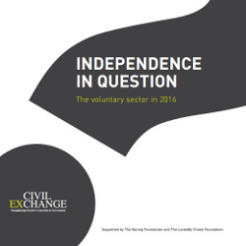The charity sector faces fundamental challenges to its independence, largely from government, according to a report published today.
The report, Independence in Question, written by Caroline Slocock, director at think tank Civil Exchange, builds on the work of the Panel of the Independence of the Voluntary Sector, a five year programme set up to measure whether charities' independence was under threat.
Slocock said: “Independence in Question shows how the cumulative impact of challenges over that period – and the rise of even more recent threats – leaves an unhealthy imbalance between community, private sector and state power and the sector in a critical position.
“More than ever, the voluntary sector must develop a new and more self-confident vision which stresses the distinctive qualities of an independent sector, challenges the status quo and shows how, collectively, it can be even better at delivering its mission.”
Key findings
“Since the Panel on the Independence of the Voluntary Sector produced its final report, An Independent Mission: the voluntary sector in 2015, a year ago, the challenges to independence that gave us such concern then have only increased.”
“In 2016, the independence of the voluntary sector is under serious attack. For some years threats to its independence have been growing steadily. The final report of the Panel on the Independence of the Voluntary Sector raised serious concerns about the challenges to sector independence. This report, which picks up where the Panel left off, concludes that the situation is now more dangerous still. Unless checked, it seems likely that the sector will face further, even more fundamental challenges to its independence in the years ahead.”
There has been “a major shift in voluntary sector funding from relatively flexible grants that enabled them to help shape public services to contracts that specified what they should deliver; and has created a competitive ‘race to the bottom’ on price."
“It is somewhat ironic that local opportunities to access and respond to the voice of an independent voluntary sector are likely to be seriously undermined by policy changes now being made right at the centre of government – changes themselves made without any prior consultation.
“Notable amongst these is the Cabinet Office’s decision to include a ‘no advocacy’ clause in grant agreements funded by the taxpayer right across the public sector. The clause stops grant funding of ‘activity intended to influence or attempt to influence Parliament, government or political parties, or attempting to influence the awarding or renewal of contracts and grants, or attempting to influence legislative or regulatory action.’ Unless exceptions are made, this measure will undermine many collaborative initiatives designed to deliver good government and better services.”
“The government is committed in the Compact to consult the voluntary sector but there was no prior consultation on either the Lobbying Act or the ‘no advocacy’ clauses. Experience of the DCLG clause suggests that organisations are unsure whether they are able to respond to government consultations if they are grant funded.”
“The climate has become increasingly negative toward charity campaigning amongst some newspapers and only a third of Conservative MPs now think is important for charities to highlight where government policies would negatively affect people, compared with 93 per cent of Labour MPs.9 Self-censorship by the voluntary sector remains a major, if unreported, issue though there are notable exceptions, for example on migration.”
“Umbrella organisations are also finding it hard to find the funds to maintain their independent action.”









